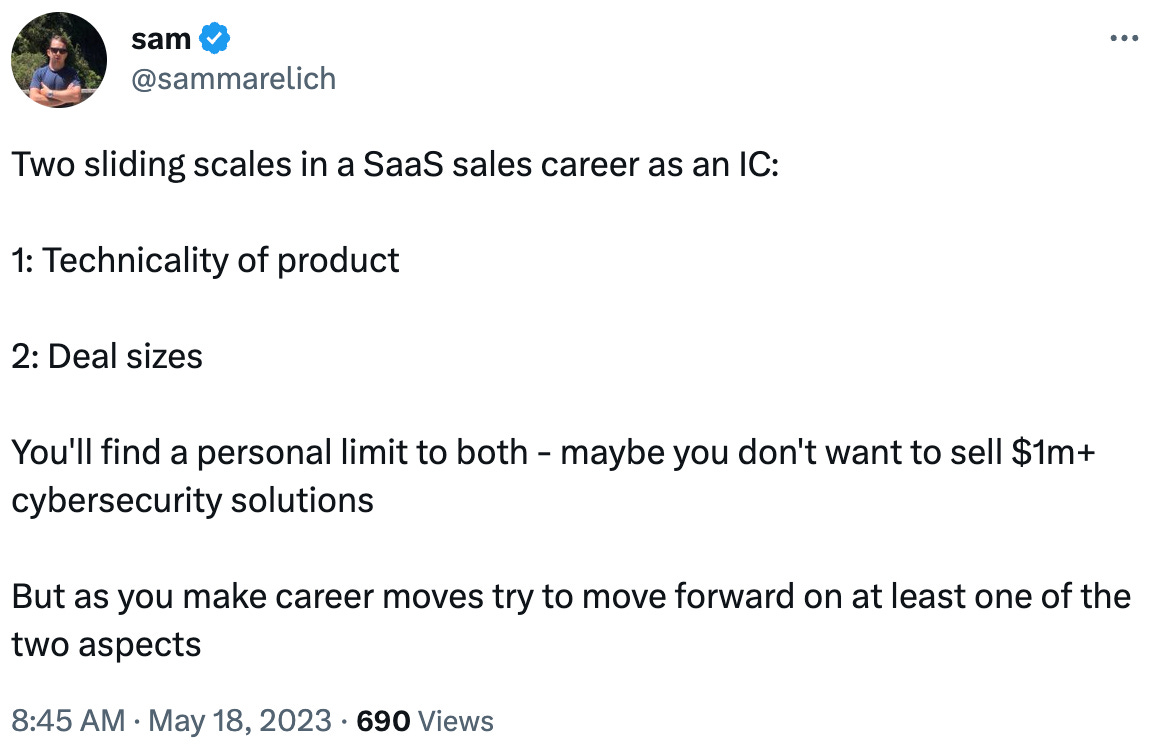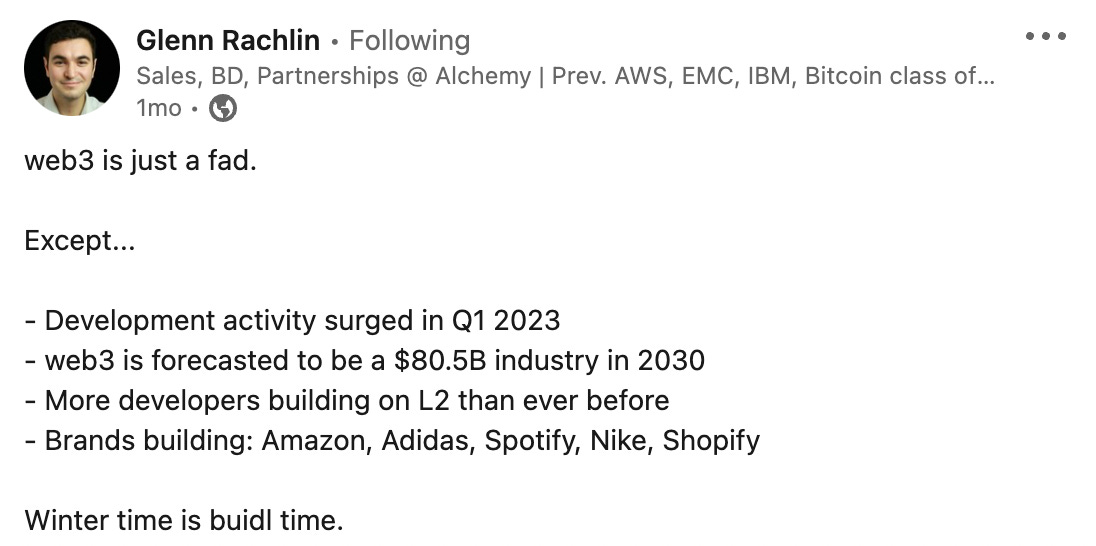Asking the Right Questions to Simplify Opportunities
Frameworks on how to find opportunity outside of competitive fields that still align with career progression.
I recently came across a SaaS Letter, a great resource on Substack for understanding trends in the SaaS space. If you’re not following, I highly suggest you do.
It helped crystallize one of the key moments in searching for a new role that I stumbled upon during a conversation with a more senior sales rep than myself. This also further solidified my refined thinking throughout the process.
One of the realizations that I came to when looking for a new role, and in lockstep, deciding what the next role would be, was initially predicated on the DevOps/Cloud space. I made some traction while also getting my foot in the door with companies that accelerate the R&D process. Thing is … I wasn’t landing offers.
The main feedback, despite building out an entire vertical at Ceros and breaking into massive F100 logos was … my deal sizes weren’t big enough. On top of that, my obsession with getting into cloud/infra blinded me from asking better questions. Specifically, looking at the key factors of what would help my grow in my career.
This all started when I had reached out cold to a strategic sales exec from RU. During our conversation he asked me a quite simple question that I had a hard time answering:
“What does the next ideal role look like?”
This seems like an obviously easy question to both answer and even think of. In my head however, I was very dead set on a specific industry, and role, rather than asking myself questions that not only would help broaden my prospective opportunities but also help me quickly evaluate a company or opportunity quickly, as well as land one on a quicker time trajectory as well.
Simplify
This also sounds seemingly obvious, and easy. The reality is quote the opposite. It required me to take a step back from what I was hyper focused on and look at what the feedback was from the market along with what would help propel my career.
This is a great perspective from @sammarelich on Twitter:
@Sammarelich twitter profile here
It captures what you should be focusing on, either getting more technical, or getting into bigger deals. I had checked the box in a short stint of getting more technical, so how could I get into an environment with bigger deals?
This made me put together a set of questions that I think can be valuable for anyone who is looking, or is in their career today. Especially if you’re more jr.
Questions to ask:
How critical is this tech?
Is it Recession Proof?
Are executives stakeholders?
Is it a bigger deal environment?
How Critical is the Tech?
If you look into the cloud/dev ops space like I was, you’d find that it’s quite obvious that anything infrastructure related is going to weather most economic downturns. It’s also a highly competitive and saturated field. Everyone is trying to get in.
But if you can’t break in, or maybe don’t want to, then what? During my journey I was fortunate enough to connect and help other reps who actually preferred not to sell to a technical audience like developers. Nothing wrong with that. And it doesn’t mean that your opportunities are limited.
The criticality of a product is dependent on many factors, not necessarily involving architecture. For example, think about industries with use cases where executives have high visibility into where a product that you’re selling fits, along with how resilient it is during market downturns.
Some examples:
Tech that helps pharmaceutical companies accelerate their R&D process
Tech that helps companies dependent on supply chain make those processes more agile and nimble
Tech that helps consumer product goods companies better understand what products to release
All these things will have high ticket values to them since executives will have visibility as those use cases are critical to what they are doing.
Is it Recession Proof
Going off those use cases and that thought track, what about the actual industry themselves? Think about industries that still tend to succeed despite economic downturns?
I was talking with a friend who was interviewing at Alchemy. This is a VC backed company in web3. Though web3 is in a winter season right now and money isn’t flowing into it since all the talk is around AI, people are still building web3 projects.
Glenn Rachlin’s LI profile here
And you know what they’ll need to build those projects? What Alchemy offers.
Another industry that is ripe for disruption is R&D and even supply chain. See McKinsey report on Disruptive Forces in Industrial Sectors
The same applies to some of the use cases that I provided above. Supply chains still need to be resilient despite market downturns, even more so actually. R&D is expensive and tech behind it has been lagging for decades. Consumer products will always be necessary no matter what. Pharmaceutical companies will continue to invest into new products despite market downturns.
You get the gist.
Are Executives Stakeholders?
With the logic applied above, the downstream effect is that executives will be stakeholders for these types of decisions. If executives are involved then you can bet that the deals associated with them are large in scope. Keep in mind that you want to focus on things that can apply to various use cases for the product that you’re selling and not just a pointed solution.
Think platform not application. And if you look at this article from Tidemark, you’ll see the trends in SaaS around how you need to be selling a product that has multiple use cases, ie Platforms of Compounding Greatness (PCG).
Is it a Bigger Deal Environment?
This was one of my personal goals in order to develop in my career. I wanted to get exposed to 7-8 figure deals and be in charge of orchestrating them. This led me to Zappi:
Tech that leverages data for early stage products
Recession Proof industries (ie CPG or QSR)
Exposure to 7 figure deals
Working with VP and C Level executives
Conclusion
Everything I’m writing about my personal decision may not be something you agree with and that’s cool. The point is you can still ask different questions that get you to the same types of opportunities that you might not have considered or thought were possible before.
As Always, thanks for reading
-Andrew Kobylarz



